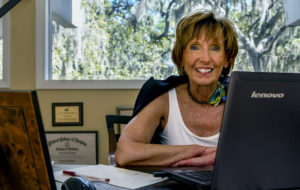Jerri Barden Perkins was heading to the peak of a powdery slope in Sun Valley, Idaho, when her ski instructor suggested they spread out from the group. As they stepped into the gondola, the women pointed their elbows away from their sides to create personal space.

It was the first of March, and coronavirus was beginning to creep through the United States. By the time Perkins, an infectious disease expert who graduated from Mary Washington in 1961, returned to her Hilton Head home in South Carolina, she was concerned. She sat down in her office overlooking peaceful Calibogue Sound to pen a letter to the editor of her local newspaper.
Like her ski instructor, Perkins believed social distancing was the way to slow the virus’s spread. But rather than scooching away from gondola-riders, Perkins was asking a town to close a bridge that provides access to an island.
“It doesn’t respect people or borders; it’s going to do its own thing,” she said of COVID-19. “If we want to survive, we have to pause and distance ourselves until we get more data and knowledge.”
Perkins, who trained with the National Institutes of Health (NIH) and recommended the first FDA therapy related to AIDS, built a career in the type of medical fact-finding being used to fight COVID-19. By the time she arrived at Mary Washington in the late 1950s, she was headed for the front lines in medicine, but her path would veer off course. Thanks to a liberal arts education, and professors who pushed her, she was ready to handle the twists and turns.
Growing up poor in Richmond, Virginia, Perkins knew she would go to college; her mother insisted. A high school job on a maternity ward ruled by male doctors gave her a drive to do better for women, and she set her sights on medical school.
She earned a $100 scholarship – “huge at the time” – from Mary Washington and filled in the gaps with government loans and part-time jobs, at the post office, in retail and with the Virginia Department of Health. She majored in chemistry, but professors encouraged her to study opera and art, and she swam, danced and golfed, gaining, she said, “the background I needed to have a very good life.”
And something else – admission to the Medical College of Virginia, where she felt better prepared than most of her classmates. Through a rotation in obstetrics, she realized her dream of delivering babies, but Perkins found the work too physical for her 100-pound frame.
A fellowship to study at NIH, with mostly men from Ivy League schools, would help her discover two things: a microorganism that causes rheumatoid-like arthritis in mice and a new way to make a difference in medicine – research.
She was working as an FDA medical officer in the ’80s, when a drug with potential made its way to her desk. She endorsed it for approval, spawning the first FDA-recommended therapy related to a deadly – and spreading – disease known as AIDS.
“AIDS changed the world and how we look at life,” said Perkins, who helped create medical regulations leading to the manufacture of safer condoms and gloves. “COVID-19 will certainly change our lives, too.”

And what a life Perkins has had. She published and presented her work across the globe, meeting Pope Francis and the King of Sweden, before building Perkins & Perkins with late husband Cal to help companies get their products to market.
In a loft water-view office, with glimpses of herons and egrets, she still does medical consulting from home. It’s where she penned that letter to the editor in March and where she’s planned with UMW Advancement’s Jan Clarke to establish and fund five scholarships, much like the one that launched her own college career.
“She’s really a pioneer,” Clarke said of Perkins. “She feels like she’s part of the students’ lives and that she’s helped make their Mary Washington experiences possible.”
And, in a world caught in the grips of COVID-19, Perkins has a message for those students, and for everyone else. Be patient, she said. A treatment will come. In the meantime, her best piece of advice?
“Listen to Dr. Fauci, the scientist,” she said. “Our economy will come back; that’s not a worry. We need to get this deadly virus under control.”

Thank you for a great article. Proud to be an eagle
So proud to know Jerri! She is a true credit to her profession.
No wonder Jerri was recognized with the Distinguished Alum Award!
Delighted to read about this outstanding alumna making such a difference in the world!
Dr. Perkins was recently featured on a few broadcasts with WVTF. See links below:
https://www.wvtf.org/post/soap-or-hand-sanitizer#stream/0
https://www.wvtf.org/post/could-new-coronavirus-mutate#stream/0
So proud to have met this great lady at two Lowcountry alumni functions.